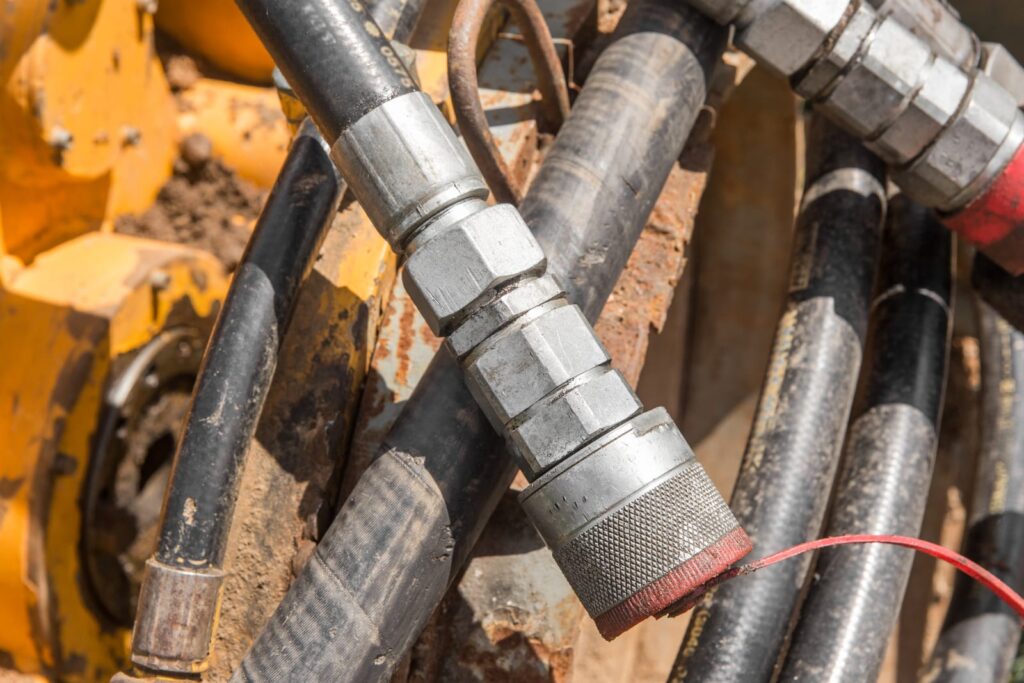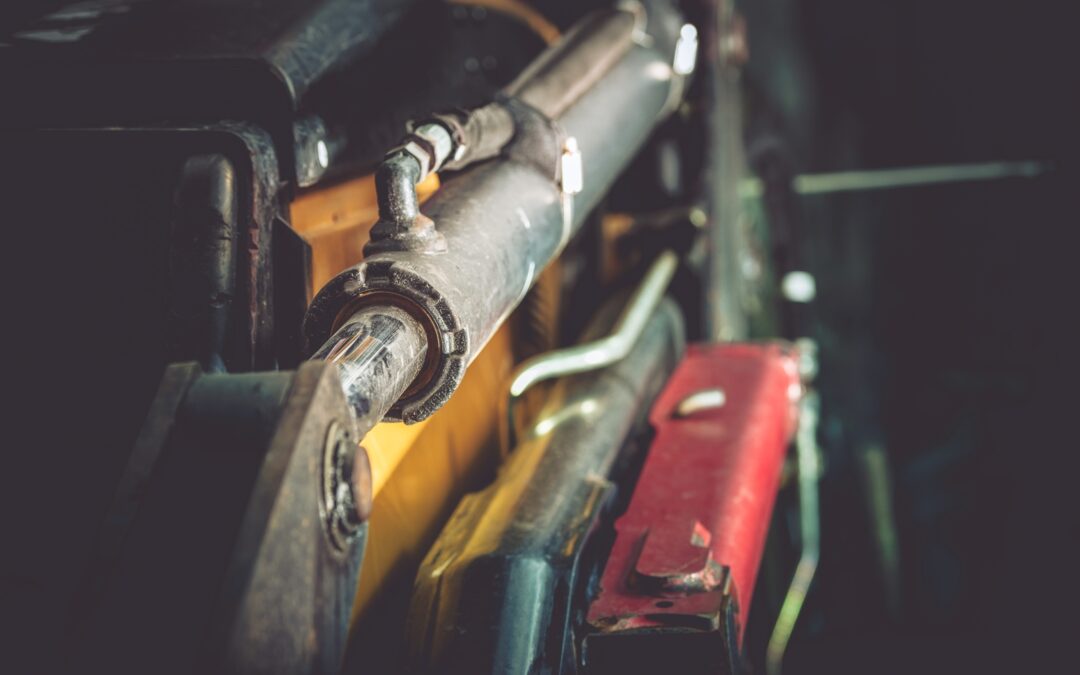Heavy equipment relies on powerful, efficient systems to handle demanding industrial tasks. Among these systems, hydraulics stand out as the driving force behind lifting, digging, and moving operations that define modern material handling. Understanding how these systems work—and maintaining them properly—directly impacts the reliability, safety, and operational costs of your equipment.
Hydraulic systems transform your equipment from basic machinery into powerhouse performers. Whether you’re operating forklifts in a warehouse or managing excavators on a construction site, these fluid-powered systems determine how effectively your equipment responds to commands, how much weight it can handle, and how long it remains operational.
At JTS Forklift Service, we’ve witnessed firsthand how well-maintained hydraulic systems can transform business operations. With over 30 years of combined expertise in material handling equipment, our team understands that hydraulic system performance directly correlates with your bottom line. When these systems operate at peak efficiency, your equipment delivers maximum productivity while minimizing unexpected downtime.
Understanding Hydraulic System Fundamentals
Hydraulic systems operate according to Pascal’s principle, utilizing pressurized fluid to generate tremendous force through interconnected components. This elegant engineering solution allows relatively small pumps to power massive lifting and moving operations with precise control.
Core Components Working Together
The hydraulic pump serves as the system’s heart, pressurizing fluid and circulating it throughout the network. This pump draws fluid from the reservoir and sends it under pressure through hoses and valves to various actuators. Modern pumps come in several designs—gear pumps for consistent flow, vane pumps for variable displacement, and piston pumps for high-pressure applications.
Hydraulic cylinders convert pressurized fluid energy into linear motion. These components handle the heavy lifting, extending and retracting to raise loads, tilt masts, or position attachments. Meanwhile, hydraulic motors generate rotational force to drive wheels or power auxiliary equipment.
Control valves regulate fluid flow and pressure throughout the system. These precision components direct fluid to specific actuators, control operation speed, and maintain system pressure within safe operating parameters. Relief valves protect against dangerous pressure spikes that could damage components or create safety hazards.
The Critical Role of Hydraulic Fluid
Hydraulic fluid does more than simply transmit power. This specialized liquid lubricates moving components, transfers heat away from critical areas, and maintains consistent pressure throughout the system. Different equipment types require specific hydraulic fluid formulations to ensure optimal performance and component longevity.
Clean fluid ensures smooth operation and prevents premature wear and tear. Contaminated fluid, however, acts like liquid sandpaper, gradually wearing away seals, valves, and cylinder walls. Regular fluid analysis helps identify contamination early, protecting your investment and preventing costly repairs.
Performance Impact of Well-Maintained Hydraulic Systems
Properly maintained hydraulic systems deliver measurable benefits across three critical areas: efficiency, reliability, and safety. These advantages translate directly into improved operational outcomes and reduced costs.
Enhanced Operational Efficiency
Clean hydraulic fluid flows more easily through system components, reducing energy consumption and improving response times. When your material handling equipment operates efficiently, operators complete tasks faster while consuming less fuel or electrical power. This efficiency improvement becomes particularly noticeable in high-demand applications where equipment runs continuously throughout shifts.
Optimal fluid viscosity ensures smooth operation across a wide range of temperatures. Fresh fluid maintains its properties better than degraded fluid, providing consistent performance whether your equipment operates in heated warehouses or outdoor environments with temperature fluctuations.
Improved System Reliability
can cause loads to drop unexpectedly, while hydraulic leaks create slip hazards and raise prevents minor issues from developing into major failures. A small hydraulic leak, addressed promptly, costs far less than replacing a damaged cylinder or pump. Scheduled inspections identify wear patterns, allowing for planned component replacement during convenient maintenance windows rather than emergency repairs during critical operations.
Preventive maintenance also significantly extends component life. Hydraulic pumps, cylinders, and valves that receive proper care can operate reliably for thousands of hours beyond their minimum specifications. This extended service life maximizes your equipment investment while reducing replacement costs.
Enhanced Safety Performance
Hydraulic system failures can create serious safety hazards. A sudden loss of lifting capacity can cause loads to drop unexpectedly, while hydraulic leaks create slip hazards and raise environmental concerns. Regular maintenance ensures safety systems function properly and components operate within design specifications.
Pressure testing verifies that relief valves and other safety components function correctly in response to abnormal conditions. This testing provides confidence that your equipment will react safely when operators encounter unexpected situations or stress on the equipment.
Recognizing Common Hydraulic Problems
Early problem identification prevents minor issues from becoming costly repairs. Several warning signs indicate your hydraulic system needs attention, and recognizing these symptoms helps you schedule maintenance before complete system failure occurs.
Performance Warning Signs
Slow or inconsistent equipment response often signals declining hydraulic performance. Internal leakage reduces system efficiency, while contaminated fluid increases friction and reduces flow rates. These performance changes typically develop gradually, making them easy to overlook until they have a significant impact on productivity.
Unusual noises from hydraulic components demand immediate attention. Grinding, squealing, or cavitation sounds from pumps indicate worn components, contaminated fluid, or inadequate fluid levels. These audible warnings often precede complete component failure by days or weeks, providing opportunities for planned maintenance.
Visual and Physical Indicators
External leaks create obvious problems, but internal leaks often cause more significant issues. Internal cylinder leakage reduces lifting capacity and causes erratic operation, while internal pump leakage decreases system pressure and flow. Regular performance testing helps identify these hidden problems before they affect operations.
Overheating indicates system stress that can accelerate component wear and fluid degradation. Excessive heat may result from contaminated fluid, worn components, or inadequate cooling. Addressing overheating quickly prevents cascading damage to multiple system components.
Contaminated fluid appears dark, cloudy, or contains visible particles. Clean hydraulic fluid should maintain a consistent color and clarity. Regular fluid sampling provides early warning of contamination that could damage sensitive components.

Professional Hydraulic System Services
Comprehensive hydraulic system service requires specialized knowledge and equipment. Professional technicians understand system interactions and utilize advanced diagnostic tools to identify the root causes, rather than simply treating obvious symptoms.
Diagnostic Excellence
Modern diagnostic equipment tests system pressure, flow rates, and component performance with precision, guiding effective repair strategies. This systematic approach ensures technicians identify all issues affecting hydraulic system operation, preventing recurring problems and unexpected failures.
Pressure testing verifies proper system operation and identifies components that are operating outside their design parameters. Flow testing reveals restrictions or internal leakage that reduces system efficiency. Temperature monitoring identifies heat sources that could accelerate component wear.
Comprehensive Repair Solutions
Hydraulic pump service addresses the most critical component of the system. Professional technicians service all major pump types, understanding the unique characteristics of each design to ensure proper repair techniques and component selection. Quality parts and proper installation procedures ensure reliable, long-lasting repairs.
Cylinder repair services include seal replacement, rod reconditioning, and complete rebuilds, as needed. Professional service includes proper seal selection, surface preparation, and testing to ensure optimal performance and service life.
Preventive Maintenance Programs
Scheduled maintenance programs tailor service intervals to account for equipment usage, operating conditions, and manufacturer recommendations. This approach optimizes maintenance timing to prevent failures while avoiding unnecessary service costs.
Fluid analysis testing provides valuable insights into system condition and helps predict maintenance needs. Regular testing identifies contamination sources, component wear, and fluid degradation that guide maintenance decisions.
The JTS Forklift Service Advantage
At JTS Forklift Service, our commitment to hydraulic system excellence has made us Utah’s trusted partner for material handling equipment maintenance. Our team combines deep technical expertise with genuine dedication to customer satisfaction, ensuring your equipment receives the specialized care it deserves.
Comprehensive Service Capabilities
Our hydraulic system services cover all aspects of system maintenance and repair. We conduct comprehensive inspections to ensure every component functions safely and efficiently, meeting industry standards and manufacturer specifications. Our technicians assess and maintain proper fluid levels, replacing degraded fluids to ensure peak system performance.
Our mobile service capabilities bring professional hydraulic system care directly to your facility. This convenience minimizes equipment downtime and eliminates transportation costs, keeping your operations running smoothly while receiving expert service.
Specialized Expertise
With expertise spanning all equipment makes and models, our technicians understand the unique requirements of different hydraulic system designs. This broad knowledge enables us to service a diverse range of equipment types effectively, from electric forklifts to construction equipment and industrial machinery.
Our specialization in electric material handling equipment includes a deep understanding of hydraulic systems used in electric forklifts, pallet jacks, and other battery-powered equipment. This expertise ensures optimal integration between hydraulic and electrical systems for maximum efficiency.
Customer-Centric Service Approach
Customer satisfaction drives every aspect of our service delivery. We understand that equipment downtime directly impacts your operations, so we prioritize rapid response times and effective solutions. Our 24/7 availability throughout Utah ensures professional hydraulic system service when you need it most.
Our technicians take pride in their work, delivering quality service that builds lasting partnerships with businesses across Utah. By focusing on your success, we ensure your hydraulic systems contribute to operational excellence and business growth.
Maximizing Equipment Performance
Hydraulic systems represent sophisticated technology that requires specialized knowledge and proper maintenance to deliver reliable performance. When problems arise, prompt professional service prevents minor issues from escalating into major expenses, while ensuring safe and efficient operations.
Regular maintenance, prompt repairs, and professional service create a comprehensive approach to hydraulic system management that protects your equipment investment. This proactive strategy minimizes unexpected downtime, reduces long-term costs, and ensures your material handling equipment delivers the performance your operations demand.
Contact JTS Forklift Service Today!
Don’t let hydraulic problems disrupt your business success. Contact JTS Forklift Service today at (801) 300-2290 to learn how our hydraulic system expertise can improve your equipment’s performance. Our experienced team stands ready to provide the professional service your hydraulic systems need to support your operational goals.
Explore JTS Forklift Service and discover comprehensive solutions that keep your equipment running at peak performance. Visit our website to learn more about our services and schedule your hydraulic system maintenance today.
GET IN TOUCH WITH US TODAY
